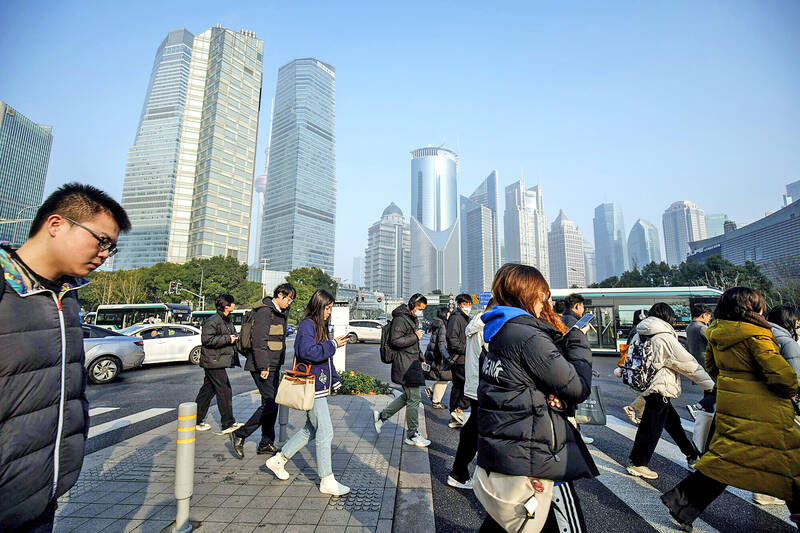The exposure of the local financial industry to China fell 11.96 percent from a year earlier to NT$1.05 trillion (US$33.61 billion) at the end of last year amid concerns over the slowing Chinese economy, data compiled by the Financial Supervisory Commission on Thursday showed.
Within the industry, Taiwanese banks’ exposure to China fell below NT$1 trillion to NT$961.0 billion, down 10.66 percent from a year earlier, the commission’s data showed.
The data indicated that exposure accounted for 22.7 percent of the industry’s net worth, the lowest level in the 42 quarters since the commission started tallying such exposure to China in the third quarter of 2013.

Photo: Bloomberg
Local banks’ exposure to China — including lending, investments and interbank loans and deposits — moved lower as worries over China’s economic outlook prompted Taiwanese banks to scale back their funding to the Chinese market, Banking Bureau Deputy Director-General Roger Lin (林志吉) said.
The IMF forecast on Friday that China’s economic growth would slow to 4.6 percent this year, down from 5.2 percent growth last year, and further moderate in the medium term, with growth of about 3.5 percent estimated for 2028.
Many Taiwanese financial firms have turned cautious about the spiraling financial crisis in the Chinese property market, where debt-ridden property giant China Evergrande Group (恆大集團) has been ordered to liquidate by a court, Lin said.
Last year, Taiwanese banks’ lending to investments in China totaled NT$244.44 billion, down 7.51 percent from a year earlier, and lending to China also fell 14.53 percent from a year earlier to NT$640.28 billion.
Bucking the downturn, the local banks’ interbank loans to Chinese counterparts and bank deposits rose 22.42 percent from a year earlier to NT$76.29 billion.
Meanwhile, local insurance companies’ investments in marketable securities in China fell 25.29 percent from a year earlier to NT$77.4 billion at the end of last year, accounting for only 0.24 percent of the sector’s total disposable funds, the commission said.
The investments in Chinese securities were all made by Taiwanese life insurers, while property and casualty insurers owned no securities in China, it said.
Last year, Taiwanese securities and futures brokerages cut their exposure to China by 10.28 percent to NT$12.94 billion, with securities firms’ exposure falling 12.91 percent to NT$9.998 billion while that of futures companies was the same as the previous year at NT$251 million, the commission said.
The commission said the decline in exposure among securities firms largely reflects financial investment strategy adjustments.

TAKING STOCK: A Taiwanese cookware firm in Vietnam urged customers to assess inventory or place orders early so shipments can reach the US while tariffs are paused Taiwanese businesses in Vietnam are exploring alternatives after the White House imposed a 46 percent import duty on Vietnamese goods, following US President Donald Trump’s announcement of “reciprocal” tariffs on the US’ trading partners. Lo Shih-liang (羅世良), chairman of Brico Industry Co (裕茂工業), a Taiwanese company that manufactures cast iron cookware and stove components in Vietnam, said that more than 40 percent of his business was tied to the US market, describing the constant US policy shifts as an emotional roller coaster. “I work during the day and stay up all night watching the news. I’ve been following US news until 3am

UNCERTAINTY: Innolux activated a stringent supply chain management mechanism, as it did during the COVID-19 pandemic, to ensure optimal inventory levels for customers Flat-panel display makers AUO Corp (友達) and Innolux Corp (群創) yesterday said that about 12 to 20 percent of their display business is at risk of potential US tariffs and that they would relocate production or shipment destinations to mitigate the levies’ effects. US tariffs would have a direct impact of US$200 million on AUO’s revenue, company chairman Paul Peng (彭雙浪) told reporters on the sidelines of the Touch Taiwan trade show in Taipei yesterday. That would make up about 12 percent of the company’s overall revenue. To cope with the tariff uncertainty, AUO plans to allocate its production to manufacturing facilities in

Six years ago, LVMH’s billionaire CEO Bernard Arnault and US President Donald Trump cut the blue ribbon on a factory in rural Texas that would make designer handbags for Louis Vuitton, one of the world’s best-known luxury brands. However, since the high-profile opening, the factory has faced a host of problems limiting production, 11 former Louis Vuitton employees said. The site has consistently ranked among the worst-performing for Louis Vuitton globally, “significantly” underperforming other facilities, said three former Louis Vuitton workers and a senior industry source, who cited internal rankings shared with staff. The plant’s problems — which have not

COLLABORATION: Given Taiwan’s key position in global supply chains, the US firm is discussing strategies with local partners and clients to deal with global uncertainties Advanced Micro Devices Inc (AMD) yesterday said it is meeting with local ecosystem partners, including Taiwan Semiconductor Manufacturing Co (TSMC, 台積電), to discuss strategies, including long-term manufacturing, to navigate uncertainties such as US tariffs, as Taiwan occupies an important position in global supply chains. AMD chief executive officer Lisa Su (蘇姿丰) told reporters that Taiwan is an important part of the chip designer’s ecosystem and she is discussing with partners and customers in Taiwan to forge strong collaborations on different areas during this critical period. AMD has just become the first artificial-intelligence (AI) server chip customer of TSMC to utilize its advanced